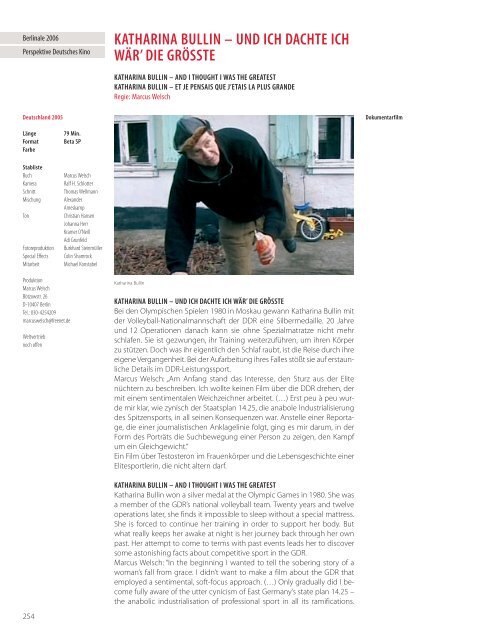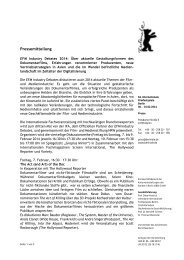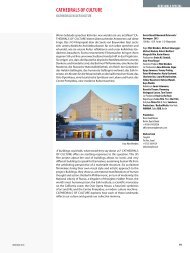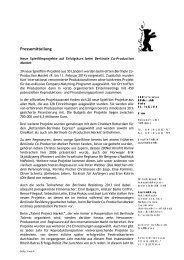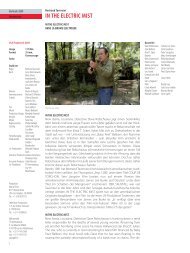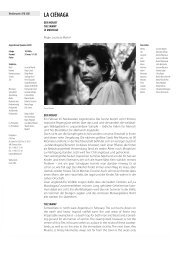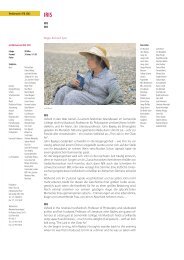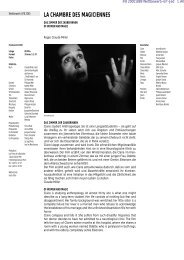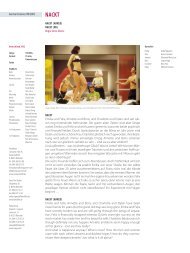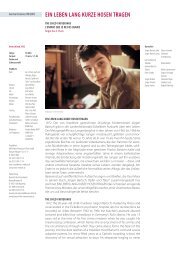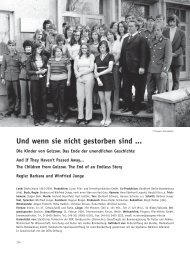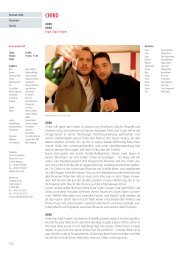KATHARINA BULLIN – UND ICH DACHTE ICH WÄR' DIE ... - Berlinale
KATHARINA BULLIN – UND ICH DACHTE ICH WÄR' DIE ... - Berlinale
KATHARINA BULLIN – UND ICH DACHTE ICH WÄR' DIE ... - Berlinale
Create successful ePaper yourself
Turn your PDF publications into a flip-book with our unique Google optimized e-Paper software.
<strong>Berlinale</strong> 2006<br />
Perspektive Deutsches Kino<br />
Deutschland 2005<br />
Länge 79 Min.<br />
Format Beta SP<br />
Farbe<br />
Stabliste<br />
Buch Marcus Welsch<br />
Kamera Ralf H. Schlotter<br />
Schnitt Thomas Wellmann<br />
Mischung Alexander<br />
Ameskamp<br />
Ton Christian Hansen<br />
Johanna Herr<br />
Kramer O’Neill<br />
Adi Grunfeld<br />
Fotoreproduktion Burkhard Steinmüller<br />
Special Effects Colin Shamrock<br />
Mitarbeit Michael Konstabel<br />
Produktion<br />
Marcus Welsch<br />
Bötzowstr. 26<br />
D-10407 Berlin<br />
Tel.: 030-4254209<br />
marcuswelsch@freenet.de<br />
Weltvertrieb<br />
noch offen<br />
254<br />
<strong>KATHARINA</strong> <strong>BULLIN</strong> <strong>–</strong> <strong>UND</strong> <strong>ICH</strong> <strong>DACHTE</strong> <strong>ICH</strong><br />
WÄR’ <strong>DIE</strong> GRÖSSTE<br />
<strong>KATHARINA</strong> <strong>BULLIN</strong> <strong>–</strong> AND I THOUGHT I WAS THE GREATEST<br />
<strong>KATHARINA</strong> <strong>BULLIN</strong> <strong>–</strong> ET JE PENSAIS QUE J’ETAIS LA PLUS GRANDE<br />
Regie: Marcus Welsch<br />
Katharina Bullin<br />
<strong>KATHARINA</strong> <strong>BULLIN</strong> <strong>–</strong> <strong>UND</strong> <strong>ICH</strong> <strong>DACHTE</strong> <strong>ICH</strong> WÄR’ <strong>DIE</strong> GRÖSSTE<br />
Bei den Olympischen Spielen 1980 in Moskau gewann Katharina Bullin mit<br />
der Volleyball-Nationalmannschaft der DDR eine Silbermedaille. 20 Jahre<br />
und 12 Operationen danach kann sie ohne Spezialmatratze nicht mehr<br />
schlafen. Sie ist gezwungen, ihr Training weiterzuführen, um ihren Körper<br />
zu stützen. Doch was ihr eigentlich den Schlaf raubt, ist die Reise durch ihre<br />
eigene Vergangenheit. Bei der Aufarbeitung ihres Falles stößt sie auf erstaunliche<br />
Details im DDR-Leistungssport.<br />
Marcus Welsch: „Am Anfang stand das Interesse, den Sturz aus der Elite<br />
nüchtern zu beschreiben. Ich wollte keinen Film über die DDR drehen, der<br />
mit einem sentimentalen Weichzeichner arbeitet. (…) Erst peu à peu wurde<br />
mir klar, wie zynisch der Staatsplan 14.25, die anabole Industrialisierung<br />
des Spitzensports, in all seinen Konsequenzen war. Anstelle einer Reportage,<br />
die einer journalistischen Anklagelinie folgt, ging es mir darum, in der<br />
Form des Porträts die Suchbewegung einer Person zu zeigen, den Kampf<br />
um ein Gleichgewicht.“<br />
Ein Film über Testosteron im Frauenkörper und die Lebensgeschichte einer<br />
Elitesportlerin, die nicht altern darf.<br />
<strong>KATHARINA</strong> <strong>BULLIN</strong> <strong>–</strong> AND I THOUGHT I WAS THE GREATEST<br />
Katharina Bullin won a silver medal at the Olympic Games in 1980. She was<br />
a member of the GDR’s national volleyball team. Twenty years and twelve<br />
operations later, she finds it impossible to sleep without a special mattress.<br />
She is forced to continue her training in order to support her body. But<br />
what really keeps her awake at night is her journey back through her own<br />
past. Her attempt to come to terms with past events leads her to discover<br />
some astonishing facts about competitive sport in the GDR.<br />
Marcus Welsch: “In the beginning I wanted to tell the sobering story of a<br />
woman’s fall from grace. I didn’t want to make a film about the GDR that<br />
employed a sentimental, soft-focus approach. (…) Only gradually did I become<br />
fully aware of the utter cynicism of East Germany’s state plan 14.25 <strong>–</strong><br />
the anabolic industrialisation of professional sport in all its ramifications.<br />
Dokumentarfilm
Marcus Welsch<br />
Biografie<br />
Geboren 1969 in Singen am Hohentwiel.<br />
Studium der Philosophie und Literaturwissenschaft<br />
in Konstanz, Toronto und Berlin.<br />
Seit 1995 Mitarbeit bei diversen Filmproduktionen<br />
u.a. als Cutter und Regieassistent<br />
bei Wolfgang Becker, Jean-Jacques Annaud,<br />
Roman Polanski. Nach verschiedenen Kurzfilmen<br />
ist dies sein erster Dokumentarfilm.<br />
Biography<br />
Born in Singen am Hohentwiel in 1969,<br />
he studied philosophy and literature in<br />
Constance, Toronto and Berlin. He joined the<br />
film industry in 1995, working on films by<br />
Wolfgang Becker, Jean-Jacques Annaud<br />
and Roman Polanski in various capacities<br />
including editor and assistant director. After<br />
a number of short films, this marks his first<br />
documentary.<br />
Biographie<br />
Né en 1969 à Singen am Hohentwiel. Etudie<br />
la philosophie et la littérature à Constance,<br />
Toronto et Berlin. A partir de 1995, collabore<br />
à diverses productions de films de<br />
Wolfgang Becker, Jean-Jacques Annaud ou<br />
Roman Polanski, entre autres comme monteur<br />
et assistant réalisateur. Après plusieurs<br />
courts, ceci est le premier long métrage<br />
documentaire de son cru.<br />
Instead of a report that follows a journalistic trajectory of accusation, I decided<br />
to use the form of a portrait in order to show what prompted this individual<br />
to begin her search and to illustrate her struggle for equilibrium.”<br />
A film about the effects of testosterone on a woman’s body that is also the<br />
story of a top athlete who is not allowed to age.<br />
<strong>KATHARINA</strong> <strong>BULLIN</strong> <strong>–</strong> ET JE PENSAIS QUE J’ETAIS LA PLUS GRANDE<br />
Aux Jeux Olympiques de 1980, à Moscou, Katharina Bullin remporte une<br />
médaille d’argent avec l’équipe nationale de volley-ball de la RDA. Vingt ans<br />
plus tard et après douze opérations, elle ne peut toujours pas dormir sans<br />
un matelas spécial. Elle est forcée de poursuivre son entraînement pour<br />
étayer son corps. Mais ce qui l’empêche en fait de dormir, c’est une incursion<br />
dans son propre passé. Lors de la remise à plat de son cas, elle tombe<br />
sur d’étonnants détails concernant le sport de compétition en RDA.<br />
Marcus Welsch: « Au départ, mon objectif était de décrire sobrement le<br />
déclin de l’élite. Je ne voulais pas tourner un film sur la RDA qui fonctionne<br />
à l’estompe sentimentale. (…) Ce n’est que peu à peu que je me suis rendu<br />
compte du cynisme du plan d’état n° 14.25, de l’industrialisation anabole du<br />
sport de compétition avec toutes les conséquences que cela implique. Au<br />
lieu d’un reportage suivant une ligne d’accusation journalistique, il s’agissait<br />
pour moi de montrer sous forme de portrait la quête d’une personne qui<br />
lutte pour son équilibre. »<br />
Un film sur la testostérone dans le corps féminin et l’histoire de la vie d’une<br />
sportive d’élite qui n’a pas le droit de vieillir.<br />
Katharina Bullin (rechts)<br />
Filmografie<br />
Kurzfilme<br />
1996 SPACE-NIGHT <strong>–</strong> EARTH DAY<br />
1998 HERZSTÜCK<br />
2002 <strong>DIE</strong> STOIBERSISTERS<br />
2005 <strong>KATHARINA</strong> <strong>BULLIN</strong> <strong>–</strong> <strong>UND</strong> <strong>ICH</strong><br />
<strong>DACHTE</strong> <strong>ICH</strong> WÄR’ <strong>DIE</strong> GRÖSSTE<br />
255


